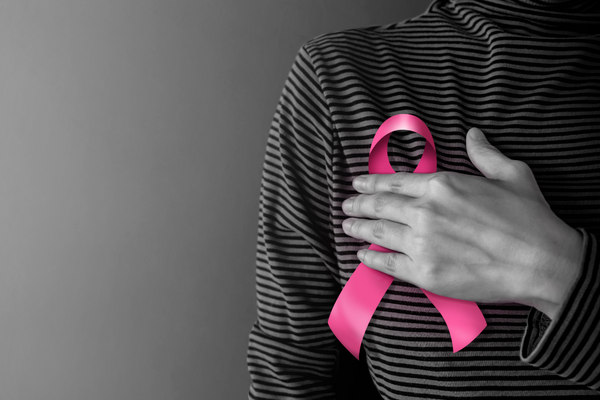Did you know that only about 15% of cancer cases are due to heredity? As shocking as that statistic may be, it can be considered as good news to many of us––meaning that the other 85% of cancer cases are primarily due to our health and lifestyle habits. Essentially, YOU are your best chance at preventing cancer!

Cancer - Know Your Risks!
We understand that life gets crazy...
Habits change, sometimes unknowingly, and all of a sudden there is no color in your diet, you don’t know the last time you had a full glass of water or eight hours of sleep, or your tennis shoes are dusty from lack of use. The illusion of time is one of the most deceitful aspects of our lives – making us think we have all the time in the world while also forcing us to rush through each moment, both of which make it more difficult to set, work toward, and achieve health goals. The fact is, “if you don’t make time for your wellness, you will be forced to make time for your illness” (anonymous).
This is NOT to say that every illness is preventable, but we contribute to our overall health more than we realize. As we move into October, also known as Breast Cancer Awareness Month, let’s dive into the various habits and lifestyle factors that can not only improve our overall health but also reduce the risk for developing breast cancer, among other types, too!
Around one third of deaths from cancer are due to the 5 leading behavioral and dietary risks: high body mass index, low fruit and vegetable intake, lack of physical activity, tobacco use, and alcohol use. These lifestyle choices are all affected by each dimension of your wellness "wheel." Let's revisit:
Social
While there isn’t much research connecting healthy relationships to a reduced risk of cancer, we instinctively know that we thrive when surrounded by those who love, support, and walk with us through life. We are hard-wired for community and connection. There IS a profound amount of research showing that strong social support is tied to better breast cancer outcomes. Being a part of various groups or communities (or “village,” if you will) helps create a positive growth mindset.
Environmental
It isn’t just the air we breathe or the amount of sun exposure we have daily that affects our bodies. It’s also the harmful chemicals contained in personal care products that might act as endocrine disruptors and thus increase the risk of breast cancer. The amount and diverse combination of ingredients in products makes it nearly impossible to show definite cause and effect for any specific ingredient. In an effort to screen what we use in our self care routines, look at the company offering the products. How often is the company needing to remove a particular ingredient due to increased research findings showing its side effects? Does the company have separate product lines, with one promoting “regular” and another “natural?” Does the company have a transparent, extensive ingredient policy with YOU in mind, rather than profit? Check out the Environmental Working Group for additional information.
Occupational
As you can imagine, there are various stressors – physical, mental, and/or emotional – within the workplace that are not always conducive to healthy living. Because of this, we have to dedicate more energy to being mindful and taking care of our body! Third shift positions have been found, in some research, to correlate with the development of breast cancer. Consider the contributing factors associated with working these types of hours… assistance with staying awake (aka caffeine and/or sugar), physical stress, inconsistent dietary habits, etc. Regardless of your occupation, prioritize healthy behaviors that may combat the side effects of working long hours, working outside, or working under significant stress loads.
Emotional
Various mental health challenges, especially mood disorders, have been linked to an increased risk of cancer. Thirty-two percent of men and 43% of women with mood disorders developed cancer less than two years after their diagnosis. There are two schools of thought behind the connection:
1) Chronic stress, anxiety, and depression suppress the body’s natural immune response, creating more opportunities for cancer cells to develop;
2) Many choose, knowingly or unknowingly, to self-medicate or treat with habits that in and of themselves increase the risk for cancer, especially breast cancer.
The strongest link showing the correlation between chronic stress and cancer is, in fact, with regards to breast cancer. The key here is to become aware of our emotional well-being, accept the potential need for help or guidance, and to actively pursue stress management techniques!
Physical
The steps to improve physical health are quite often the most well-known, yet the most ignored or underestimated. By avoiding tobacco products and limiting alcohol consumption, you are directly reducing your risk of inflammation, as well as cellular damage to various organs – thus, improving the health and efficacy of your body’s organ systems! We all want everything to work as best as they can, right? Continue to support your body by consuming a whole foods diet and moving regularly. Inflammation, while helpful to fight potential bacteria or viral invaders, has a healthy limit. Anything beyond that limit creates chaos, and that chaos prohibits your body from working and growing efficiently.
Prevention requires evaluation.
Take a step back and evaluate your own well-being. What is one thing you can do today to be more actively involved in your health, in your prevention of breast cancer (and other cancers)? Here are some ideas from The National Cancer Institute! Reduce exposure to:
- chronic inflammation
- processed foods
- alcohol consumption
- smoking
- unsafe sex practices
If you’re not sure where or how to start, we offer a variety of programs and services to help you address these risk factors and achieve your optimal well-being. Get in touch with us today!
